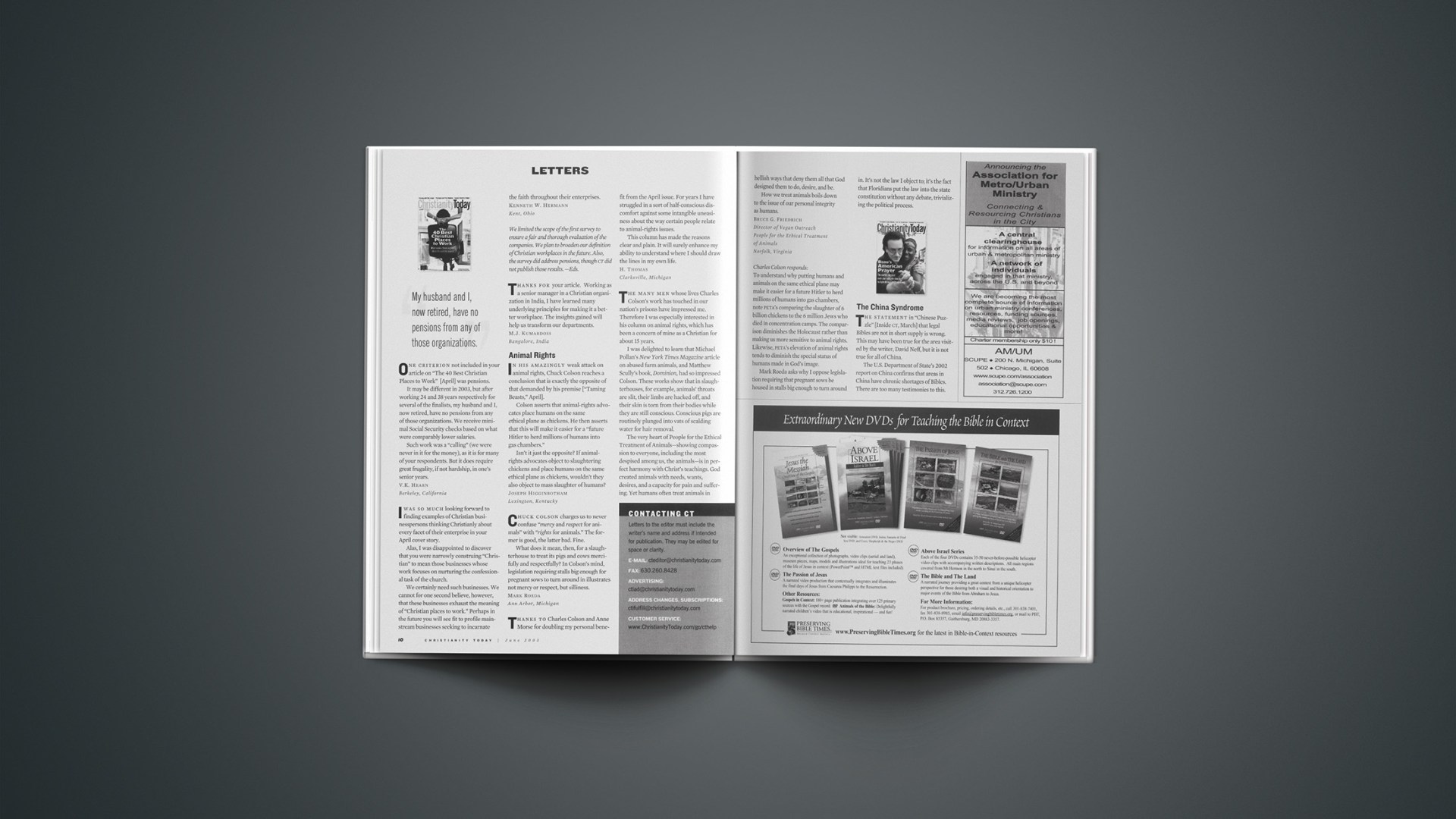One criterion not included in your article on “The 40 Best Christian Places to Work” [April] was pensions.
It may be different in 2003, but after working 24 and 38 years respectively for several of the finalists, my husband and I, now retired, have no pensions from any
of those organizations. We receive minimal Social Security checks based on what were comparably lower salaries.
Such work was a “calling” (we were never in it for the money), as it is for many of your respondents. But it does require great frugality, if not hardship, in one’s senior years.
V.K. Hearn Berkeley, California
I was so much looking forward to finding examples of Christian businesspersons thinking Christianly about every facet of their enterprise in your April cover story.
Alas, I was disappointed to discover that you were narrowly construing “Christian” to mean those businesses whose work focuses on nurturing the confessional task of the church.
We certainly need such businesses. We cannot for one second believe, however, that these businesses exhaust the meaning of “Christian places to work.” Perhaps in the future you will see fit to profile mainstream businesses seeking to incarnate the faith throughout their enterprises.
Kenneth W. Hermann Kent, Ohio
We limited the scope of the first survey to ensure a fair and thorough evaluation of the companies. We plan to broaden our definition of Christian workplaces in the future. Also, the survey did address pensions, though CT did not publish those results. —Eds.
Thanks for your article. Working as a senior manager in a Christian organization in India, I have learned many underlying principles for making it a better workplace. The insights gained will help us transform our departments.
M.J. Kumardoss Bangalore, India
Animal Rights
In his amazingly weak attack on animal rights, Chuck Colson reaches a conclusion that is exactly the opposite of that demanded by his premise [“Taming Beasts,” April].
Colson asserts that animal-rights advocates place humans on the same ethical plane as chickens. He then asserts that this will make it easier for a “future Hitler to herd millions of humans into gas chambers.”
Isn’t it just the opposite? If animal-rights advocates object to slaughtering chickens and place humans on the same ethical plane as chickens, wouldn’t they also object to mass slaughter of humans?
Joseph Higginbotham Lexington, Kentucky
Chuck colson charges us to never confuse “mercy and respect for animals” with “rights for animals.” The former is good, the latter bad. Fine.
What does it mean, then, for a slaughterhouse to treat its pigs and cows mercifully and respectfully? In Colson’s mind, legislation requiring stalls big enough for pregnant sows to turn around in illustrates not mercy or respect, but silliness.
Mark Roeda Ann Arbor, Michigan
Thanks to Charles Colson and Anne Morse for doubling my personal benefit from the April issue. For years I have struggled in a sort of half-conscious discomfort against some intangible uneasiness about the way certain people relate to animal-rights issues.
This column has made the reasons clear and plain. It will surely enhance my ability to understand where I should draw the lines in my own life.
H. Thomas Clarksville, Michigan
The many men whose lives Charles Colson’s work has touched in our nation’s prisons have impressed me. Therefore I was especially interested in his column on animal rights, which has been a concern of mine as a Christian for about 15 years.
I was delighted to learn that Michael Pollan’s New York Times Magazine article on abused farm animals, and Matthew Scully’s book, Dominion, had so impressed Colson. These works show that in slaughterhouses, for example, animals’ throats are slit, their limbs are hacked off, and their skin is torn from their bodies while they are still conscious. Conscious pigs are routinely plunged into vats of scalding water for hair removal.
The very heart of People for the Ethical Treatment of Animals—showing compassion to everyone, including the most despised among us, the animals—is in perfect harmony with Christ’s teachings. God created animals with needs, wants, desires, and a capacity for pain and suffering. Yet humans often treat animals in hellish ways that deny them all that God designed them to do, desire, and be.
How we treat animals boils down to the issue of our personal integrity as humans.
Bruce G. Friedrich Director of Vegan Outreach People for the Ethical Treatment of Animals Norfolk, Virginia
Charles Colson responds:
To understand why putting humans and animals on the same ethical plane may make it easier for a future Hitler to herd millions of humans into gas chambers, note PETA’s comparing the slaughter of 6 billion chickens to the 6 million Jews who died in concentration camps. The comparison diminishes the Holocaust rather than making us more sensitive to animal rights. Likewise, PETA’s elevation of animal rights tends to diminish the special status of humans made in God’s image.
Mark Roeda asks why I oppose legislation requiring that pregnant sows be housed in stalls big enough to turn around in. It’s not the law I object to; it’s the fact that Floridians put the law into the state constitution without any debate, trivializing the political process.
The China Syndrome
The statement in “Chinese Puzzle” [Inside ct, March] that legal Bibles are not in short supply is wrong. This may have been true for the area visited by the writer, David Neff, but it is not true for all of China.
The U.S. Department of State’s 2002 report on China confirms that areas in China have chronic shortages of Bibles. There are too many testimonies to this. The Voice of the Martyrs points out that China loves to tell the world that it prints Bibles, but officials don’t mention that most of those are for other countries.
Nor do they tell you that only those belonging to the registered church can purchase Bibles.
I will close with a request we received from a missionary who is currently in China. “We are hungry,” he said. “Please feed us!” This was code for their need of more Bibles. Why would they be asking for more Bibles if there are enough Bibles in China?
Deborah Piedt Eau Claire, Michigan
CT is arranging a pro-con debate for a future issue on the question of smuggling Bibles into China. —Eds.
Kephale Revisited
Since you published four letters in your April issue disagreeing with me that the Greek kephale (“head”) means “person in authority over,” I would like to mention two things:
(1) Among the more than 50 ancient Greek examples of the form “person A is the kephale of person B,” person A is one who has authority over person B. No exceptions have ever been found. Verses speaking of Christ as “head” surely cannot be used to deny that the “head” is the one in authority!
(2) The letters you published all seemed unaware of the latest research on kephale (see my Biblical Foundations for Manhood and Womanhood [Crossway, 2002]). The most respected Greek lexicographer in the world, Peter Glare of Oxford, editor of the Liddell-Scott Greek-English Lexicon: Supplement, says about kephale, “The supposed sense ‘source’ of course does not exist.”
Wayne Grudem Research Professor of Bible and Theology Phoenix Seminary Scottsdale, Arizona
Copyright © 2003 Christianity Today. Click for reprint information.









